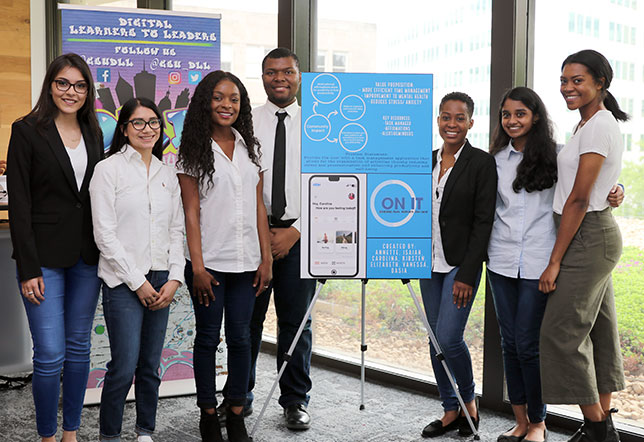Cultivating Digital Leaders
A program at Georgia State University is widening the scope of digital literacy to include problem-solving and leadership strategies.
Category: Education Futurists
Institution: Georgia State University
Project: Digital Learners to Leaders
Project lead: Tiffany Green-Abdullah, assistant director of learning community development
Tech lineup: Angular, Arduino, HTC Vive, IBM, Raspberry Pi, Reallusion

Georgia State University's digital learners
Most every college or university recognizes the importance of digital literacy to future graduates, and increasingly, you'll find technology competencies and digital skill development experiences included widely in general education programs. But at Georgia State University, leaders within the Center for Excellence in Teaching and Learning are making certain that GSU's digital literacy offerings will spawn not only technically competent individuals, but also a diverse range of professional leaders who know how to use their technology skills in context for better problem solving.
Digital Learners to Leaders is an experiential learning program aimed at developing the next generation of digital problem solvers through industry/higher-education partnerships and exposure to digital technologies and the Internet of Things. DLL began as a co-curricular program, seeing its first cohort of 45 students in Spring 2018. After a successful first pilot semester, the program expanded to include increasingly larger numbers of students. DLL continues to evolve, holding open-access events that are available to all GSU students.

Tiffany Green-Abdullah
Inclusivity has been key to making the program work. It's important to make sure DLL is available to all students, not just those at certain levels or within selected departments. "You don't have to be narrowly focused on majors to make a huge impact on students," noted Tiffany Green-Abdullah, who first established and led the DLL program from her post in CETL as assistant director of learning community development.
When she begins the Fall 2020 semester, Green-Abdullah will have a faculty position as well as serving under CETL as a strategic consultant for the university, giving guidance as GSU offers, for the first time, DLL in credit-bearing courses. The first of these courses will be offered through GSU's Creative Media Industries Institute and the larger College of Arts and Sciences.
As CETL looks at moving DLL further into the credit-bearing space, it is exploring ways to bring the program's experiential learning components to the university's for-credit classes. The focus is on creating courses aimed at providing professional experiences within the undergraduate curriculum. To do this CETL is leveraging partnerships with campus resources, such as the university's incubator space. The move to for-credit courses will occur as CETL works with receptive departments to identify courses and degrees that can benefit from the experiential elements provided by DLL. With each DLL implementation, CETL staff expects to see participating students reach new levels of professional potential, supporting the university's overall "College to Career" initiative.
An important element of DLL has always been its engagement of external corporate and nonprofit communities. DLL first started with a Digital Economy Initiative grant from the Silicon Valley Community Foundation in partnership with Cisco Corporate Social Responsibility. It later expanded with funding from State Farm. Even as DLL grows and is offered more widely within the curriculum, industry professionals will be consulted so that students across majors can learn highly relevant skills ranging from coding and computational thinking to entrepreneurship, project management and communication. Experts from Atlanta's surrounding professional communities will continue to teach workshops on ideation, graphic design, user experience and interface design.
Typically, students in the DLL program get experience with a wide range of technologies coupled with the opportunity to hone their problem-solving and leadership skills. For example, during the course of the program, DLL team members work together to solve a specific problem they've identified. They are given access to IoT technologies (such as Raspberry Pi, Arduino, 3D printers, and drones), VR/AR tools (like HTC Vive volumetric capture studio and Reallusion 3D modeling software) and application development and AI technologies (including Swift, Java, Angular, Python and IBM Watson).
Groups have used these tools to develop prototypes of solutions such as "Ecodrop," a gamified recycling system which lets participants earn points for recycling through an app; or "On It," an Android app that organizes task management and offers affirmations and alerts. Other projects have included "Financial-VReality," a VR game to teach financial responsibility and "Waste-Not," a networked application to combat food waste through shared recipes and donation.
GSU's diverse student teams bring their own unique insights to DLL projects, and CETL staff recognize that as a central value for the continuing success of the DLL program. Green-Abdullah noted that among their proudest moments, CETL staff have seen some of the first DLL students go on to lead and advise their peers. She added, "We anticipate seeing students in successive DLL cohorts provide a growing pool of mentors and professional models for future DLL students."
Return to Campus Technology Impact Awards Home